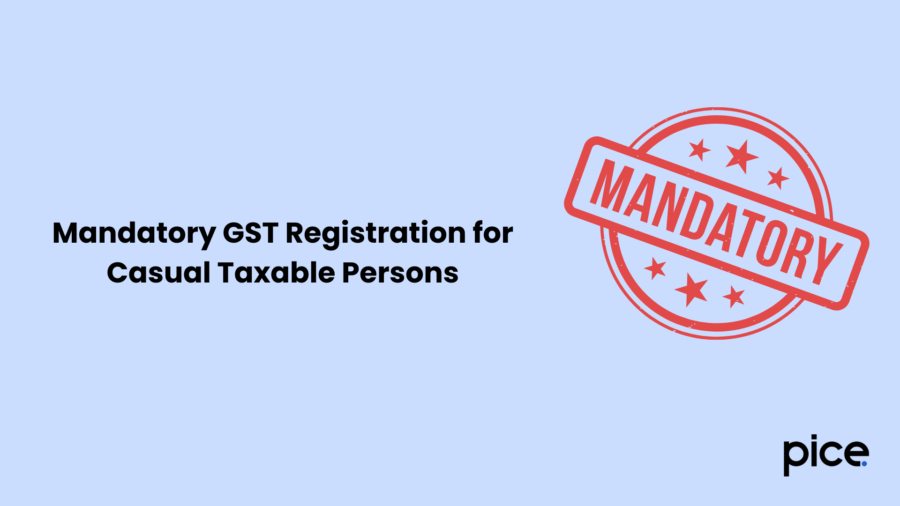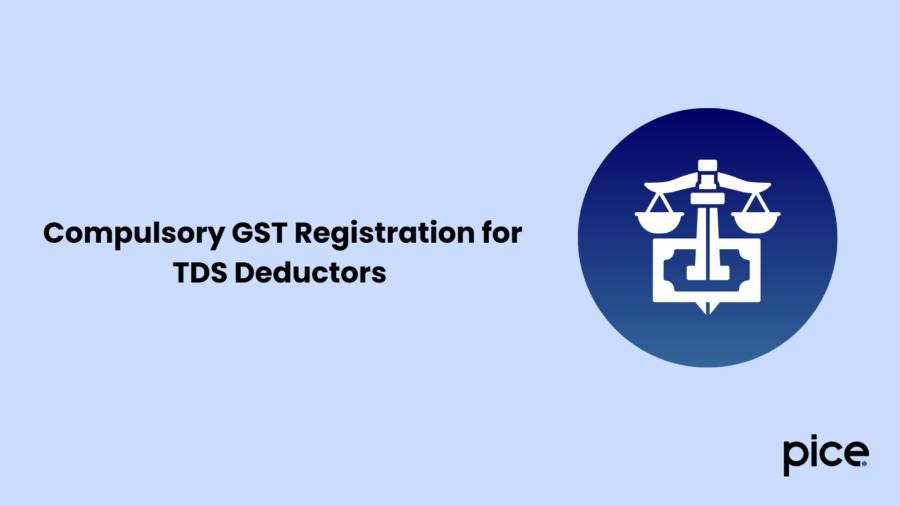Compulsory Registration Under GST
- 9 Apr 25
- 9 mins

Compulsory Registration Under GST
- GST Registration
- General Threshold Limits
- Mandatory GST Registration Criteria for Inter-state Supplies
- Mandatory GST Registration for Casual Taxable Persons
- GST Registration Under Reverse Charge Mechanism
- Mandatory GST Registration for Non-Resident Taxable Person
- Compulsory GST Registration for Service Providers Using E-commerce Operators
- Compulsory GST Registration for TDS Deductors
- Compulsory GST Registration for Specified Individuals
- Compulsory GST Registration for ISD
- Categories Exempt from Registration, Even if Falling Under Section 24(1)
- Conclusion
Key Takeaways
- GST registration is mandatory for specific businesses, regardless of turnover, under Section 24 of the CGST Act.
- Inter-state suppliers, e-commerce operators, and those under reverse charge must register for GST compulsorily.
- Threshold limits vary: ₹40 lakh for goods, ₹20 lakh for services, and lower for special category states.
- Casual and non-resident taxable persons must register under GST without turnover exemptions, with few exceptions.
- Registration criteria ensures legal compliance, ITC benefits, and smooth business operations.
The Goods and Services Tax (GST) is a unified tax system in India that mandates businesses to register based on turnover and other specific criteria. While voluntary registration is an option for small businesses, compulsory registration is required for certain entities, irrespective of turnover. This ensures tax compliance, transparency, and seamless input tax credit (ITC) flow.
Businesses engaged in inter-state supplies, e-commerce operations, and certain notified services must register under GST without considering their annual revenue. Non-compliance with compulsory registration can lead to hefty penalties, legal consequences, and disruption of business operations.
Thus, in this article, we explore the GST registration rules and regulations that complies with Indian tax laws.
GST Registration

Section 22(1) of the CGST Act highlights the exemption limit for GST (Goods and Services Tax) registration in India. Specific categories of persons need to register under GST mandatorily, irrespective of the threshold limit, as per Section 24 of the Act, for the supply of services and goods, as follows:
- Dealers involved in taxable interstate supply (registered person).
- Casual taxable persons dealing with taxable services and goods.
- Individuals paying tax under the reverse charge mechanism.
- E-commerce operators (Electronic commerce operators)
- Non-resident taxable persons
- Persons liable to deduct tax under Section 51
- Input Service Distributors (ISD)
- Individuals making taxable supplies on behalf of taxable persons.
- If you provide online information and database services followed by retrieval services from abroad to a person in India (excluding registered persons).
- Any other category, as notified by the government on the GST Council’s recommendation.
General Threshold Limits
The threshold limits for GST registration are as follows:
- Goods Suppliers: If you are a supplier of goods with an annual turnover exceeding ₹40 lakh, you must register under GST.
- Service Suppliers: If you are a service supplier with an aggregate annual turnover of ₹20 lakh, you need to register under GST as per the GST Council's regulations.
Special Category States
The threshold limit for GST registration differs for unique category states such as Arunachal Pradesh, Jammu & Kashmir, Assam, Manipur, Mizoram, Meghalaya, Nagaland, Tripura, Sikkim, Himachal Pradesh and Uttarakhand. Businesses in these states need to register under GST if their annual business turnover for goods supply is ₹20 lakh and for service supply is ₹10 lakh.
Mandatory GST Registration Criteria for Inter-state Supplies
Businesses dealing with inter-state supplies need to mandatorily register under GST as per Section 24(i) of the GST Act. However, here are the exceptions to the rule:
Exceptions to Compulsory Registration Under GST
The exceptions to compulsory GST registration for inter-state supplies are as follows:
- Inter-state Service Supply: Suppliers of inter-state services are exempt from GST registration if their aggregate annual turnover is less than ₹20 lakh in India. For special category states, the turnover is less than ₹10 lakh.
- Inter-state Handicrafts Goods or Specified Products Supply: Craftsmen and producers of specified products involved in inter-state supply are exempted from GST registration if their annual turnover does not exceed ₹20 lakh or ₹10 lakh (as applicable).
Mandatory GST Registration for Casual Taxable Persons

Section 24(ii) of the GST Act mandates casual taxpayers to register under GST. However, the exceptions to the norm are as follows:
Exceptions to the Registration Requirement
Here are the exceptions to GST registration for casual taxable persons:
- Individuals who supply handicraft goods or additional specified products beyond the territory of their home state or union territory and have an annual turnover of less than ₹20 lakh across India are exempt from casual registration. For special category states, the threshold limit is ₹10 lakh.
- Suppose a supplier is engaged in the movement of goods based on approval wherein invoice issuance is at the time of delivery of goods. In that case, they are exempted from casual registration.
GST Registration Under Reverse Charge Mechanism
Section 24 (iii) of the GST Act mandates individuals liable to pay taxes on a reverse charge basis to register themselves under GST regardless of the aggregate annual turnover. These individuals need to pay taxes on the inward supply of goods (purchases) instead of the suppliers paying taxes.
On the flip side, if a person supplies goods or services under the reverse charge mechanism, with the tax liability on the purchaser, under Section 9(3) of the Act, he/she is exempted from GST registration.
Mandatory GST Registration for Non-Resident Taxable Person
If a non-resident Indian engages in taxable supply in India, he/she needs to mandatorily register under GST under Section 24 (v) of the GST Act. Notably, the turnover limit does not apply in such a case.
Compulsory GST Registration for Service Providers Using E-commerce Operators
Section 24 (iv) of the CGST Act regulates service providers rendering services through e-commerce operators to register under GST. Nevertheless, the concerned e-commerce operator is liable to pay taxes on behalf of the service supplier if the latter's annual turnover is less than ₹20 lakh or ₹10 lakh (as applicable). The e-commerce operator need not register under GST as per Section 22 of the CGST Act.
Here is the list of services included as per Section 9(5):
- Passenger Transportation Services: Services offered by radio taxis, maxi cabs, motor cabs and motorcycles are some of the inclusions.
- Housekeeping Services: This category of services includes carpentry, plumbing and additional maintenance services.
- Accommodation Services: Services that hotels, guest houses, inns, clubs, campsites and commercial establishments provide for residential or lodging are inclusions in this category.
Compulsory GST Registration for TDS Deductors

Suppose an individual or entity is GST-registered for business activities. In that case, however, they need to deduct tax at source (TDS) under Section 51 and register separately as tax deductors under GST as per the regulations of Section 24 (vi) of the CGST Act. Even if the person or entity is not registered under GST, they have to register as a tax deductor separately.
Compulsory GST Registration for Specified Individuals
Section 24 (xii) of the CGST Act highlights that special categories of persons, as specified by the State or central government based on the GST Council's recommendations, need mandatory registration under GST. The central or State Government reserves the right to identify and notify specific individuals about the GST registration mandate.
Compulsory GST Registration for ISD
Here are the regulations for GST registration for Input Service Distributors:
- Compulsory GST Registration: Input Service Distributors must register under GST mandatorily even if they are already registered under the Act for other business purposes.
- Role of ISD: Input Service Distributors are entitled to distribute ITC (input tax credit) to help each unit of an entity utilise tax credits through appropriate allocation.
Additional Provisions for GST Registration
Here are the provisions for GST registration under Section 24 of the CGST Act:
- Exempted Products: Individuals who deal with exempted goods are not liable to register under GST. However, they must register themselves if they fall under the reverse charge mechanism.
- Reverse Charge Liability: If you are an individual operating under a reverse charge basis, you must mandatorily register under GST.
- Section 23 of the CGST Act: If you are exempted under Section 23 of the CGST and SGST Act, you do not need to register under GST.
Categories Exempt from Registration, Even if Falling Under Section 24(1)
Here are the exempted categories despite coming under Section 24(1):
- Suppliers of Non-taxable Goods and Services: If you are an individual supplying goods or services not taxable under GST, you are exempted from GST registration.
- Exempt Goods and Services: In case you are an individual supplying exempted goods or services, you do not have to register under GST.
- Agriculturists: Individuals involved in agricultural activities and land production are exempt from GST registration.
- Recipients Paying Taxes for Supplies: If a person supplies goods or services under the reverse charge mechanism, the purchaser has the tax liability, and thus, the supplier is exempt from GST registration.
Conclusion
GST registration is made compulsory in the interest of transparency, compliance, and efficient collection of taxes, which will ultimately benefit the businesses and the Indian economy. Knowledge of the various circumstances, exemptions, and compulsory registration requirements under GST will help in avoiding penalties and other legal complications.
Businesses are advised to figure out whether they are obliged to get registered under GST while dealing in interstate trade, e-commerce, or supply of taxable services. By adhering to the registration law, a business can carry out its operations smoothly, claim input tax credits, and contribute to a more orderly taxation system prevailing in India.
💡If you want to streamline your payment and make GST payments via credit or debit card or UPI, consider using the PICE App. Explore the PICE App today and take your business to new heights.
 By
By 

















